- Home
- Neal Stephenson
Anathem Page 20
Anathem Read online
Page 20
“Going to your new job?”
“Delrakhones has me doing an internship. Hey, Raz, where the heck are you going?”
“The starhenge.”
“But that’s—” He grabbed my arm. “Hey, idiot, you could be Thrown Back!”
“It’s more important that I do this than that I not be Thrown Back,” I said. Which was pretty stupid, but I was feeling rebellious and not thinking very hard. “I’ll explain it to you later.”
I had led Lio off the inner walkway, which was too crowded for comfort, and out toward the periphery of the Fendant court as if we were going to stand on the ledge. Along the way we had to pass through a narrow arch. He made an after-you gesture. I stepped into the arch—and realized at the same instant that I’d just turned my back on him. By the time that had penetrated my brain, he had my arm wrapped up the wrong way. I had a choice: move, and spend the next two months with my arm in a sling, or not move. I chose not to move.
My tongue still worked. “Good to see you again, Thistlehead. First you get me in trouble—now this.”
“You got your own self in trouble. Now I’m going to make sure you don’t do it again.”
“Is this how they do things in the New Circle?”
“You shouldn’t even try to speak of how Eliger came out until you know what’s going on.”
“Well, if you’ll let go of me so I can get up to the starhenge, my next step will be the Refectory where I’ll get all the latest.”
“Look,” he said, and levered me around so that I could see back the way we had come. A hush had fallen over the stairs. I was half afraid we’d been seen. But then I saw a procession of black-clad figures in tall hats on their way up. They passed into the chasm above and began to clang on the ironwork.
“Huh,” I said, “no wonder it’s so clean up there.”
“You’ve been up there!?” Lio was so startled that he tightened his grip on me in a way that hurt.
“Let go! I promise I won’t go any farther up,” I said.
Lio released my arm. I slowly and judiciously got it arranged in a more human position before standing up to face him.
“What did you see?” Lio wanted to know.
“Nothing yet, but there’s a tablet up there I have to retrieve that might—might—give us a hint.”
He considered it. “That will be a challenging operation.”
“Is that a promise, Lio?”
“Just an observation.”
“Do those Ita go up there on some kind of a predictable schedule?”
Lio parted his lips to answer, then got a shrewd look on his face and said, “I’m not going to tell you that.” Then something occurred to him. “Look, I’m late.”
“Since when do you care about that?”
“A lot has changed. I have to go. Now. Talk to you later, okay?”
“Lio!”
He turned to look back at me. “What!?”
“Who was Fraa Paphlagon?”
“He taught Fraa Orolo half of what he knew.”
“Who taught him the other half?” I asked, but Lio was already gone. For a minute I stood there listening to the upward progress of the Ita, wondering whether they checked the equipment for tablets. Wondering where I could get myself an Ita disguise.
Then my stomach growled. As if it were wired directly to my feet, I headed for the Refectory.
It had been ten years and a couple of months since I had watched a moving picture, but I could still remember a kind of scene where a spaceman walks into a starport bar, or a steppe rider into a dusty saloon, and all goes silent for a few moments. That was how it was when I entered the Refectory.
I had arrived early—a mistake, since it gave me no way of controlling who I would sit with. A few of the Edharians had come early and staked out tables, but they glanced away from me when I tried to catch their eye. I got in the queue behind a couple of Edharian cosmographers, but they turned their backs on me and put on a show of discussing, with great intensity, some new proof that they had found in the ten years’ worth of books and journals that had been dumped on the threshold of the library at Apert.
It was the Reformed Old Faanians’ night to serve dinner. Arsibalt gave me an extra dollop of stew and shook my hand—the first warm greeting I had received. We agreed to talk later. He seemed happy.
I decided to sit down at an empty table and see what happened. Within a few minutes, fraas and suurs of the New Circle began to cluster around me, and each had some jovial remark to throw my way about my time in the cell.
After a quarter of an hour, Fraa Corlandin showed up cradling something old, dark, and crusty, like a mummified infant. He set it down on the table and peeled off some wrappings. It was an ancient firkin of wine. “From our chapterhouse to you, Fraa Erasmas,” he announced, in lieu of a greeting. “One who has endured extraordinary penance deserves an extraordinary libation. This won’t give you those weeks back. But it will help you forget everything about the Book!”
Corlandin was being a little bit clever. I was glad of it. Given his liaison with Suur Trestanas—which I assumed was still going on—this moment was bound to be awkward. The wine was both a kind gesture and a way of sliding past that awkwardness. Though as he fussed with the stopper I felt a little uneasy. Was this also meant to be a celebration of my joining their order?
Fraa Corlandin seemed to be reading my mind. “This is strictly to celebrate your freedom—not to encroach on it!” he said.
Someone else had fetched a wooden case and opened it to reveal a matched set of silver thimbles, each engraved with the crest of the New Circle. A fraa and a suur plucked these one by one from their velvet-lined niches and polished them with their bolts. Corlandin busied himself with the stopper, a brittle contraption of clay and beeswax, difficult to remove without shattering it and contaminating the wine. Just to watch Fraa Corlandin was to feel a link to a time when concents had been richer, classier, more well-endowed, and—though this made no sense at all—somehow older than they were now.
The cask was obviously made of Vrone oak, which meant that the wine inside of it had been made, in some other concent, from the juice of the library grape, and sent here to age.
The library grape had been sequenced by the avout of the Concent of the Lower Vrone in the days before the Second Sack. Every cell carried in its nucleus the genetic sequences, not just of a single species, but of every naturally occurring species of grape that the Vrone avout had ever heard of—and if those people hadn’t heard of a grape, it wasn’t worth knowing about. In addition, it carried excerpts from the genetic sequences of thousands of different berries, fruits, flowers, and herbs: just those snatches of data that, when invoked by the biochemical messaging system of the host cell, produced flavorful molecules. Each nucleus was an archive, vaster than the Great Library of Baz, storing codes for shaping almost every molecule nature had ever produced that left an impression on the human olfactory system.
A given vine could not express all of those genes at once—it could not be a hundred different species of grape at the same time—so it “decided” which of those genes to express—what grape to be, and what flavors to borrow—based on some impossibly murky and ambiguous data-gathering and decision-making process that the Vrone avout had hand-coded into its proteins. No nuance of sun, soil, weather, or wind was too subtle for the library grape to take into account. Nothing that the cultivator did, or failed to do, went undetected or failed to have its consequences in the flavor of the juice. The library grape was legendary for its skill in penetrating the subterfuges of winemakers who were so arrogant as to believe they could trick it into being the same grape two seasons in a row. The only people who had ever really understood it had been lined up against a wall and shot during the Second Sack. Many modern winemakers chose to play it safe and use old-fashioned grapes. Developing a fruitful relationship with the library grape was left to fanatics like Fraa Orolo, who had made it his avocation. Of course, library grapes hated the conditions at Saunt Edhar, and
were still reacting to an incident fifty years ago when Orolo’s predecessor had pruned the vines incorrectly, poisoning the soil with bad memories encoded in pheromones. The grapes chose to grow up small, pale, and bitter. The resulting wine was an acquired taste, and we didn’t even try to sell it.
We had better luck with trees and casks. For while the Vrone avout had been busy creating the library grape, their fraas and suurs a few miles up the valley at the rustic math of Upper Vrone Forest had been at similar pains with the trees that were traditionally fashioned into casks. The cells of the Vrone oak’s heart-wood—still half alive, even after the tree had been chopped down, sliced into staves, and bound into a cask—sampled the molecules drifting around in the wine, releasing some, making others percolate outward until they precipitated on the outside of the cask as fragrant sheens, rinds, and encrustations. This wood was as choosy about the conditions under which it was stored as the library grape was about weather and soil, so a winemaker who treated the casks poorly, and didn’t provide them with the stimulation they liked, would be punished by finding them crusted and oozing with all the most desirable resins, sugars, and tannins, with nothing left on the inside of the cask but cleaning solvent. The wood liked the same range of temperature and humidity as humans, and its cellular structure was responsive to vibrations. The casks, like musical instruments, resonated in sympathy with the human voice, and so wine that had been stored in a vault used for choir rehearsals would taste different from that stashed along the walls of a dining room. The climate at Saunt Edhar’s was well suited to growing Vrone oaks. Better yet, we were somewhat renowned for our prowess with aging. Casks felt comfortable in our Refectory and our Mynster, and responded warmly to all the talking and singing. Less fortunate concents shipped their casks here to age. We ended up with some pretty good stuff. We weren’t really supposed to drink it, but every so often we would cheat a little.
Corlandin got the stopper out without incident and decanted the wine into a blown-quartz laboratory flask, and from there served it out into the thimbles. The first of these was passed to me, but I knew better than to drink from it right away. Everyone at the table had to get one—last of all Fraa Corlandin, who raised his, looked me in the eye, and said, “To Fraa Erasmas, on the occasion of his freedom—long may it last, richly may he enjoy it, wisely may he use it.”
Then clinking all around. I was uneasy about the “wisely may he use it” part, but I drank anyway.
The stuff was tremendous, like drinking your favorite book. The others had all stood for the toast. Now they sat down, allowing me to see the rest of the Refectory. Some tables were watching the toast and hoisting tankards of whatever they were drinking. Others were involved in their own conversations. Standing around the edges of the place, mostly alone, were the ones I most wanted to talk to: Orolo, Jesry, Tulia, and Haligastreme.
Dinner became quite long, and not very ascetic. They kept refilling my glass. I felt very well taken care of.
“Someone get him to his pallet,” I heard a fraa saying, “he’s finished.”
Hands were under my arms, helping me to my feet. I let them escort me as far as the Cloister before I shook them off.
My time in the Mynster had made me well aware of which parts of the concent could not be seen from the Warden Regulant’s windows. I made several orbits around the Cloister, just to clear my head, and then went into the garden and sat down on a bench that was shielded from view.
“Are you even a sentient being at this point or should I wait until the morning?” a voice asked. I looked over to discover that Tulia had joined me. I was pretty sure she had woken me up.
“Please,” I said, and patted the bench next to me. Tulia sat down but kept her distance, the better to get a thigh up on the bench and turn sideways to face me.
“I’m glad you’re out,” she said, “a lot has been going on.”
“So I gathered,” I said. “Is there any way to sum it up quickly?”
“Something’s…funny with Orolo. No one knows what.”
“Come on! The starhenge has been locked! What else is there to know?”
“That’s obvious,” she said, a little bit annoyed at my tone, “but no one knows why. We think Orolo knows, but he’s not telling.”
“Okay. Sorry.”
“It has been shaping Eliger. Some fids who were expected to join the Edharians have gone to other orders.”
“I noticed that. Why? What’s the logic?”
“I’m not so sure it is logical. Until Apert, all the fids knew exactly what they wanted to do. Then so many things happened at once: the Inquisitors. Your penance. The closure of the starhenge. Fraa Paphlagon’s Evocation. It shook people up—made them rethink it.”
“Rethink it how?”
“It got everyone thinking politically. They made decisions they might not have done otherwise. For one thing, it cast doubt on the wisdom of joining the Edharians.”
“You mean because they are on the outs politically?”
“They’re always on the outs politically. But seeing what happened to you, people got to thinking that it was unwise to turn one’s back on that side of the concent.”
“I’m starting to get it,” I said. “So a guy like Arsibalt, by going to the Reformed Old Faanians, who want him desperately—”
“Can become important in the Reformed Old Faanians, right away.”
“I noticed he was serving the main course at supper.” That was an honor normally reserved for senior fraas.
“He could become the FAE. Or a hierarch. Maybe even Primate. And he could fight some of the idiotic things that have been going on lately.”
“So the ones who have been going to the Edharians—”
“Are the best of the best.”
“Like Jesry.”
“Exactly.”
“We’re going to screen you Edharians, protect you on the political front, so that you can be free to do what you do best,” I said.
“Uh, that’s the gist of it—but who’s this ‘you’ and ‘we’ you’re talking about?”
“Clearly where this is going is that tomorrow you join the Edharians and I join the New Circle.”
“That’s what everyone expects. It’s not what is going to happen, Raz.”
“You’ve been—holding a space for me in the Edharians?”
“That’s an awfully blunt way of putting it.”
“I can’t believe the Edharians want me that badly.”
“They don’t.”
“What!?”
“If they held a secret ballot, well, it’s not clear that they would vote for you over me. I’m sorry, Raz, but I have to be honest. A lot of the suurs in particular want me to join them.”
“Why don’t we both join them?”
“It is considered impossible. I don’t know the particulars—but some sort of deal has been made between Corlandin and Haligastreme. It’s decided.”
“If the Edharians don’t want me, why are we even discussing this?” I asked. “Did you see that keg the New Circle tapped for me? They want me bad. So why don’t I join them and you go to the loving embrace of the suurs of the Edharian chapter?”
“Because it’s not what Orolo wants. He says he needs you as part of his team.”
That affected me so much that between it and the wine I almost cried. I sat quietly for a while.
“Well,” I said, “Orolo doesn’t know everything about what is going on.”
“What are you talking about?”
I looked around. The Cloister was too small and quiet for my taste. “Let’s go for a walk,” I said.
I said no more until we were on the other side of the river, strolling in the moon-shadow of the wall, and then I told her about what I had done during Voco.
“Well!” she said, after a long silence. “That settles that, anyway.”
“What settles what?”
“You have to go to the Edharians.”
“Tulia, first of all, no one knows besides yo
u and Lio. Second, I’ll probably never come up with a way to retrieve the tablet. Third, it’s probably not going to contain any useful information!”
“Details,” she scoffed. “You’re missing my whole point. What you did shows that Orolo is correct. You do belong on his team.”
“What about you? Where do you belong, Tulia?”
She wasn’t comfortable with that. I had to ask her again.
“What happened, on Tenth Night, happened. All of us made decisions. Maybe later we’ll think better of them.”
“And to what extent is this seen as my fault?”
“Who cares?”
“I care. I wish I could have come down out of that cell to talk people out of it.”
“I don’t like the way you are thinking about this at all,” she said. “It’s like the rest of us became adults while you were up there—and you didn’t.”
That one made me stop in my tracks and blow air for a while. Tulia kept going for a couple of paces, then rounded on me. “To what extent is this seen as my fault?” she said, mimicking me. “Who cares? It’s done. It’s over.”
“I care because it has a big effect on how I am seen by the rest of the Edharians—”
“Stop caring,” she said, “or at least stop talking about it.”
“Okay,” I said, “sorry, but I’ve always thought of you as a person others could talk to about those kinds of feelings—”
“You think I want to spend the rest of my life being that person? For everyone in the concent?”
“Apparently you don’t.”
“All right. We’re done. You go find Haligastreme. I’ll find Corlandin. We’ll tell them that we are joining their respective orders tomorrow.”
“Okay,” I said with a fake-nonchalant shrug, and turned around to walk back toward the bridge. Tulia caught up with me and fell in step alongside. I was silent for a while—a little bit distracted by the prospect of joining a chapter that didn’t want me, many of whose members might blame me for taking Tulia’s place.
Some part of me wanted to hate Tulia for being so hard on me. But by the time we had crossed over the bridge, that voice, I’m happy to say, had been silenced. I was to hear it again from time to time in the future, but I would do my best to ignore it. I was scared to death to be joining the Edharians under these circumstances. But to forge ahead and just do it without leaning on Tulia’s, or anyone else’s, shoulder felt better—felt right. As when you just know you’re on the right track with a theorical proof, and all the rest is details. A splinter of the beauty Orolo had spoken of was reaching out toward me through the dark, and I would follow it like a road.

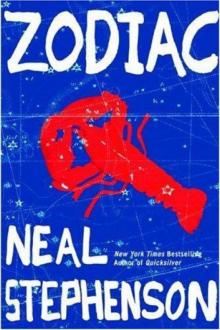 Zodiac: The Eco-Thriller
Zodiac: The Eco-Thriller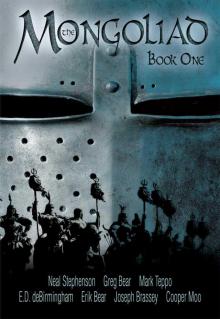 The Mongoliad: Book One
The Mongoliad: Book One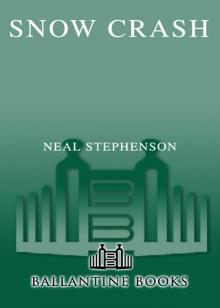 Snow Crash
Snow Crash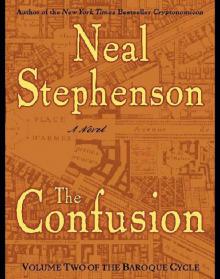 The Confusion: Volume Two of the Baroque Cycle
The Confusion: Volume Two of the Baroque Cycle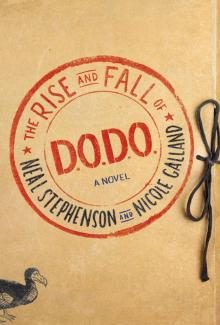 The Rise and Fall of D.O.D.O.
The Rise and Fall of D.O.D.O.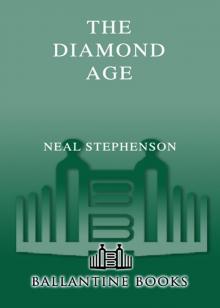 The Diamond Age: Or, a Young Lady's Illustrated Primer
The Diamond Age: Or, a Young Lady's Illustrated Primer The Big U
The Big U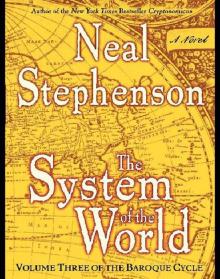 The System of the World: Volume Three of the Baroque Cycle
The System of the World: Volume Three of the Baroque Cycle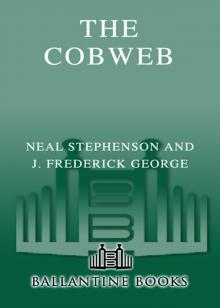 The Cobweb
The Cobweb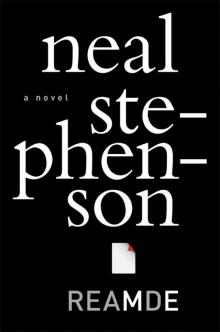 Reamde
Reamde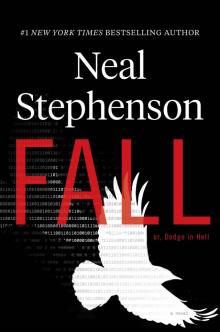 Fall; or, Dodge in Hell
Fall; or, Dodge in Hell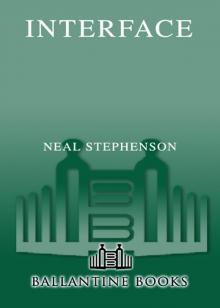 Interface
Interface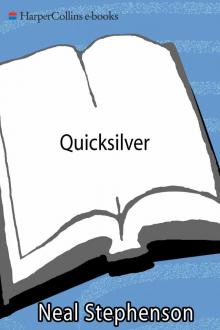 Quicksilver
Quicksilver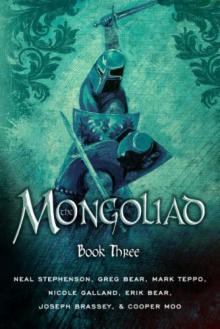 The Mongoliad: Book Three
The Mongoliad: Book Three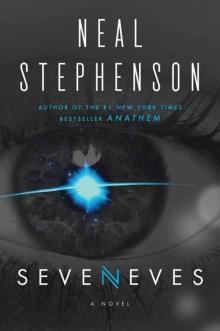 Seveneves
Seveneves Atmosphæra Incognita
Atmosphæra Incognita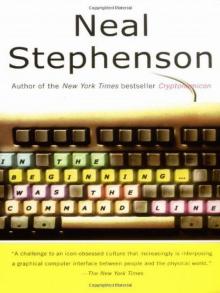 In the Beginning...Was the Command Line
In the Beginning...Was the Command Line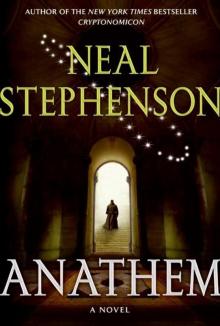 Anathem
Anathem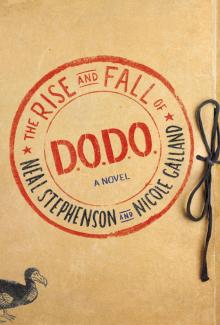 The Rise and Fall of D.O.D.O.: A Novel
The Rise and Fall of D.O.D.O.: A Novel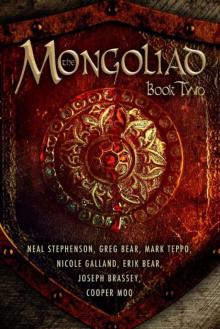 The Mongoliad: Book Two
The Mongoliad: Book Two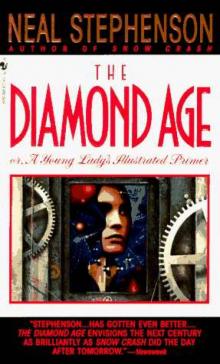 Diamond Age or a Young Lady's Illustrated Primer
Diamond Age or a Young Lady's Illustrated Primer THE System OF THE WORLD
THE System OF THE WORLD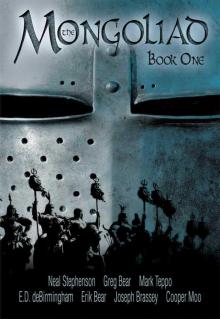 The Mongoliad: Book One tfs-1
The Mongoliad: Book One tfs-1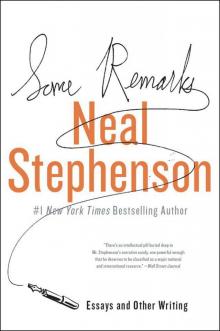 Some Remarks: Essays and Other Writing
Some Remarks: Essays and Other Writing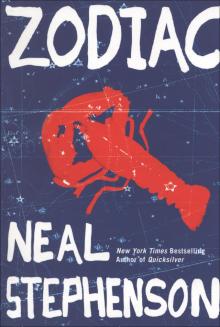 Zodiac
Zodiac Spew
Spew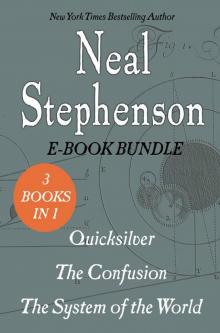 The Baroque Cycle: Quicksilver, the Confusion, and the System of the World
The Baroque Cycle: Quicksilver, the Confusion, and the System of the World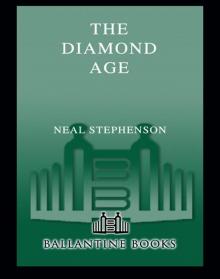 The Diamond Age
The Diamond Age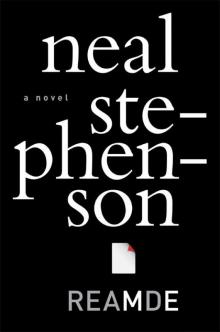 Reamde: A Novel
Reamde: A Novel In the Kingdom of Mao Bell
In the Kingdom of Mao Bell Mother Earth Mother Board
Mother Earth Mother Board Twelve Tomorrows - Visionary stories of the near future inspired by today's technologies
Twelve Tomorrows - Visionary stories of the near future inspired by today's technologies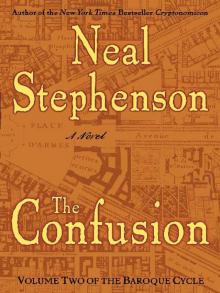 The Confusion
The Confusion The Great Simoleon Caper
The Great Simoleon Caper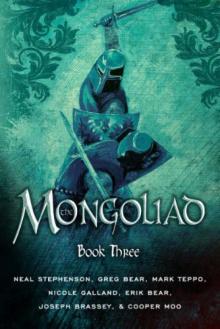 The Mongoliad: Book Three tfs-3
The Mongoliad: Book Three tfs-3